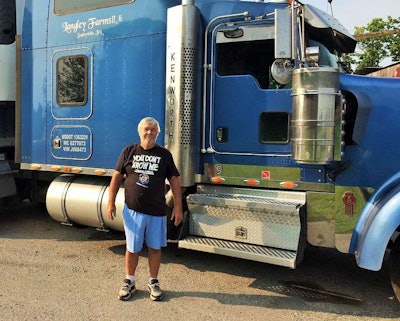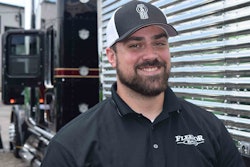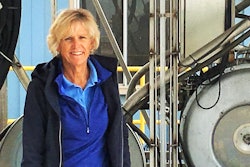Previously in this series: Quicker pay, lower fees trending for factoring, other fast cash
At D&S Factors, long associated with Truckstop.com and its family of companies, keeping it simple has been the watchword for its factoring arrangements with independent owner-operators and small fleets, says Thayne Boren, vice president of sales. The company uses a brief agreement at startup and a rate structure that supports the company’s goal to be “transparent with our fees,” unlike some other factors, he says. There’s a “very low” client turnover rate. The application process has a 24- to 48-hour turnaround, sometimes less.
“As long as you don’t have financial fraud in your background and you have authority, it’s really pretty simple,” Boren says.
For a one-truck independent, a factoring arrangement shouldn’t take much time to set up, whether it’s “a guy with one invoice” or someone looking for a long-term relationship, says Blaine Waugh, senior vice president of sales for Triumph Business Capital. The company’s longest contract, about 30 pages, typically covers recourse arrangements for small fleets with particular custom needs.
The proliferation of smartphones has played a big role in the growth of factoring and newer versions of quick pay services. Phones and tablets serve as customer portals for access to invoice creation/scanning and transmission, broker credit checks or credit lines. Mobile-based services have reduced the hassles associated with mailing paperwork, greatly speeding up the process.

Nonrecourse arrangements most often require a credit OK from the factoring company to factor one of a carrier’s invoices. Most companies give a yes or no to any individual broker, though the Apex Capital company runs a variation on that by specifying credit maximum amounts for each broker. In the past, a trucker might need to call in to the factor for the credit check, but most today offer self-serve portals online.
Owner-operator Hayden Eady describes the Trucking Partners portal as a basic website accessible from anywhere on any device. “If you don’t find the broker on their website, you shoot them an e-mail,” he says. “Within 30 seconds, they usually tell you yes or no” on whether the load will be factorable or not. “If they tell you no, and you haul it, you’re responsible for collecting that money. The approved list of brokers grows from day to day — you might check on one today that’s not approved, and it’s there tomorrow.”
OTR Capital functions in much the same way, owner-operator Tim Philmon says. If you’re working the DAT load boards, Triumph is the factoring partner there, and whether a load is factorable or not via Triumph is visible on the board. At Truckstop.com, greater integration with D&S’ service is part of future plans.
TBS Factoring still has the occasional carrier client that delivers bills and other paperwork in-person to its office in Oklahoma City. However, the company is planning a system where an owner-operator “is uploading all their documentation in perfect order, where it’s an automatic payment process,” company head Jennifer Fogg says. “If we can do that, it reduces our operating expense to where we can be more aggressive with rate structures. We’re not quite there yet as an industry.”
That day is getting close, Eady says. With Trucking Partners, he “rarely needed to talk to anyone on the phone. Best part about it is I didn’t have to keep up with all these bills of lading and remember which broker to send what to. Doing the same thing every time made it all a lot easier.”
Ease of document transfer has helped drive the diversification of factoring company services, says Apex’s Chief Strategy Officer Brian Carlgren. For the owner-operator with one truck, getting paid quickly is as simple as using a phone app to “snap a picture of the bill of lading, punch in a few fields, and we then create the invoice and can fund them within a few hours.”
Technology changes also are happening at TBS, Fogg says. Both companies say that it’s allowing them to enhance their relationships with clients with other services, even if it ultimately gets the customer to a position where they no longer need to factor.
As an Apex client, Carlgren says, “you get something like a personal business consultant.”
Fogg says that factoring isn’t always the most cost-effective method for maintaining positive cash flow. “We talk a lot with customers about getting to a bankable position” where they can withstand small short-term payment delays, she says.
Long-term relationships, however, and access to wider services keep many owner-operators in business with their factoring partners. Dewey Langley, owner-operator of the three-truck Zephyrhills, Florida-based Langley Farms reefer-hauling fleet, started factoring with Apex in 2009 when unfamiliar brokers were not paying.
 Small fleet owner Dewey Langley and one of his power units.
Small fleet owner Dewey Langley and one of his power units.Nine years later, though much of his business is conducted with relatively familiar customers, he still uses various Apex services. His wife handles most of the paperwork associated with employing two drivers in addition to himself and everything else.
Apex “has a load board that’s available to us,” Langley says, and a fuel card that also optimizes IFTA accounting. “They do our credit checks for us.” Apex also keeps him apprised of load settlements, which gives him a window into his customers’ practices and business’ health. “They’ll have to drive us away” to get us to leave, he says.
Next in this series: Factoring: A view from the broker’s side











